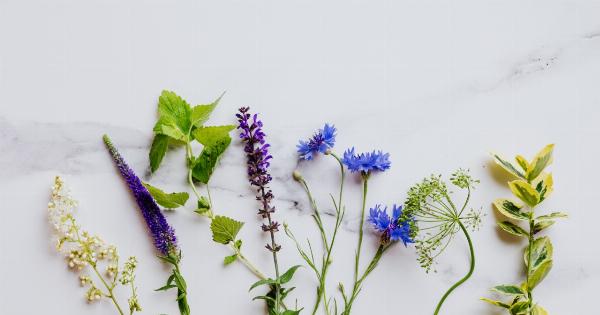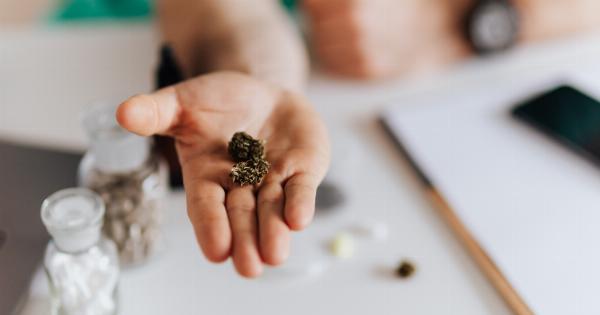Are you currently taking any medications? If so, it’s important to be aware of potential herb-drug interactions.
While herbs are generally safe and can provide various health benefits, they may interact with certain medications, leading to harmful effects or reducing the effectiveness of the drugs. In this article, we will explore some commonly used herbs and the medications they may interact with. It is crucial to consult with a healthcare professional before combining herbs with any prescribed medication.
1. St. John’s Wort
St. John’s Wort is a popular herb used for its antidepressant and mood-enhancing properties. However, it can be problematic when combined with certain medications, including:.
- Antidepressants (such as selective serotonin reuptake inhibitors or SSRIs)
- Birth control pills
- Blood-thinning medications
- HIV protease inhibitors
St. John’s Wort can decrease the effectiveness of these medications or interfere with their metabolism in the body, leading to potentially serious health consequences.
2. Garlic
Garlic is well-known for its numerous health benefits and its ability to boost the immune system. However, it can also interact with certain medications, including:.
- Anticoagulant medications (such as warfarin)
- Antiplatelet medications (such as aspirin)
- Protease inhibitors (used to treat HIV/AIDS)
Garlic can increase the risk of bleeding when combined with blood-thinning medications, and it may interfere with the effectiveness of certain antiviral medications.
3. Ginkgo Biloba
Ginkgo Biloba is a popular herb used for enhancing memory and improving cognitive function. However, it can interact with certain medications, including:.
- Anticoagulant medications
- Antiplatelet medications
- Selective serotonin reuptake inhibitors (SSRIs)
Ginkgo Biloba can increase the risk of bleeding when combined with blood-thinning medications, and it may also increase the risk of serotonin syndrome in combination with certain antidepressant medications.
4. Echinacea
Echinacea is often used as an immune booster and for its potential to prevent or reduce the severity of colds and flu. However, it may interact with certain medications, including:.
- Immunosuppressant medications (such as cyclosporine)
- Medications for autoimmune diseases (such as rheumatoid arthritis)
- Some medications used to treat liver diseases
Echinacea can potentially interfere with the immune system and the metabolism of certain medications, affecting their efficacy.
5. Ginseng
Ginseng is a popular herb known for its potential to boost energy levels and improve overall well-being. However, it can interact with certain medications, including:.
- Warfarin (an anticoagulant)
- Antidiabetic medications
- Immunosuppressant medications
Ginseng can reduce the effectiveness of anticoagulant medications, increase or decrease blood sugar levels, and potentially interfere with the immune system or the metabolism of certain drugs.
6. Licorice
Licorice root is a common herb used for its potential digestive and respiratory benefits. However, it can interact with certain medications, including:.
- High blood pressure medications
- Diuretics
- Medications that lower potassium levels
Licorice can decrease the effectiveness of high blood pressure medications, increase the risk of low potassium levels, and interfere with the balance of electrolytes in the body.
7. Saw Palmetto
Saw palmetto is often used as a natural remedy for benign prostatic hyperplasia (BPH) and to promote prostate health. However, it may interact with certain medications, including:.
- Hormonal medications
- Contraceptive drugs
Saw palmetto can interfere with the hormonal balance when combined with certain medications, potentially reducing their effectiveness.
8. Valerian
Valerian root is a well-known herb used for its calming and sleep-inducing effects. However, it can interact with certain medications, including:.
- Sedatives
- Antidepressants
- Anti-anxiety medications
Valerian can intensify the sedative effects of these medications, leading to excessive drowsiness or dizziness.
9. Milk Thistle
Milk thistle is a herb widely used for its potential to support liver health and promote detoxification. However, it may interact with certain medications, including:.
- Anticoagulant medications
- Antiepileptic medications
- Some chemotherapy drugs
Milk thistle can interfere with the metabolism of these medications, potentially reducing their effectiveness or increasing the risk of side effects.
10. Kava
Kava is a herb commonly used for its calming and anxiety-reducing effects. However, it can interact with certain medications, including:.
- Sedatives
- Antidepressants
- Antipsychotic medications
Kava can enhance the sedative effects of these medications, leading to excessive drowsiness or impaired coordination.
Conclusion
While herbs can offer various health benefits, they have the potential to interact with certain medications, leading to potentially harmful effects.
It is crucial to inform your healthcare provider about any herbs you are taking or considering, as well as any prescribed medications you are currently on. Your healthcare provider can assess the potential risks and benefits of combining herbs with medications and provide appropriate guidance.






























